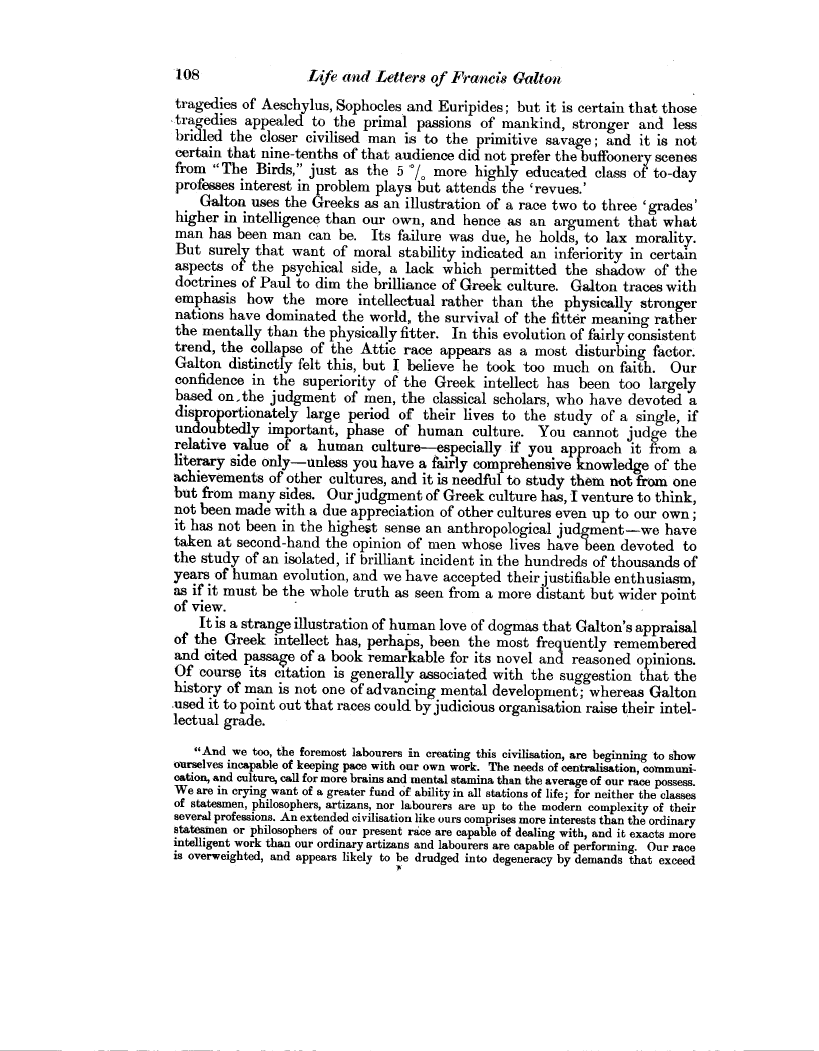108 Life and Letters o f Francis Oalton
tragedies of Aeschylus, Sophocles and Euripides ; but it is certain that those tragedies appealed to the primal passions of mankind, stronger and less bridled the closer civilised man is to the primitive savage ; and it is not certain that nine-tenths of that audience did not prefer the buffoonery scenes from "The Birds," just as the 5 °/o more highly educated class of to-day professes interest in problem plays but attends the `revues.'
Galton uses the Greeks as an illustration of a race two to three `grades' higher in intelligence than our own, and hence as an argument that what man has been man can be. Its failure was due, he holds, to lax morality. But surely that want of moral stability indicated an inferiority in certain aspects of the psychical side, a lack which permitted the shadow of the doctrines of Paul to dim the brilliance of Greek culture. Galton traces with emphasis how the more intellectual rather than the physically stronger nations have dominated the world, the survival of the fitter meaning rather the mentally than the physically fitter. In this evolution of fairly consistent trend, the collapse of the Attic race appears as a most disturbing factor. Galton distinctly felt this, but I believe he took too much on faith. Our confidence in the superiority of the Greek intellect has been too largely based on-the judgment of men, the classical scholars, who have devoted a disproportionately large period of their lives to the study of a single, if undoubtedly important, phase of human culture. You cannot judge the relative value of a human culture-especially if' you approach it from a literary side only-unless you have a fairly comprehensive knowledge of the achievements of other cultures, and it is needful to study them not from one but from many sides. Our Judgment of Greek culture has, 'I venture to think, not been made with a due appreciation of other cultures even up to our own ; it has not been in the highest sense an anthropological judgment-we have taken at second-hand the opinion of men whose lives have been devoted to the study of an isolated, if brilliant incident in the hundreds of thousands of years of human evolution, and we have accepted their justifiable enthusiasm, as if it must be the whole truth as seen from a more distant but wider point of view.
It is a strange illustration of human love of dogmas that Galton's appraisal of the Greek intellect has, perhaps, been the most frequently remembered and cited passage of a book remarkable for its novel and reasoned opinions. Of course its citation is generally associated with the suggestion that the history of man is not one of advancing mental development; whereas Galton .used it to point out that races could by judicious organisation raise their intellectual grade.
"And we too, the foremost labourers in creating this civilisation, are beginning to show ourselves incapable of keeping pace with our own work. The needs of centralisation, communication, and culture, call for more brains and mental stamina than the average of our race possess. We are in crying want of a greater fund of ability in all stations of life; for neither the classes of statesmen, philosophers, artizans, nor labourers are up to the modern complexity of their several professions. An extended civilisation like ours comprises more interests than the ordinary statesmen or philosophers of our present race are capable of dealing with, and it exacts more intelligent work than our ordinary artizans and labourers are capable of performing. Our race is overweighted, and appears likely to be drudged into degeneracy by demands that exceed

